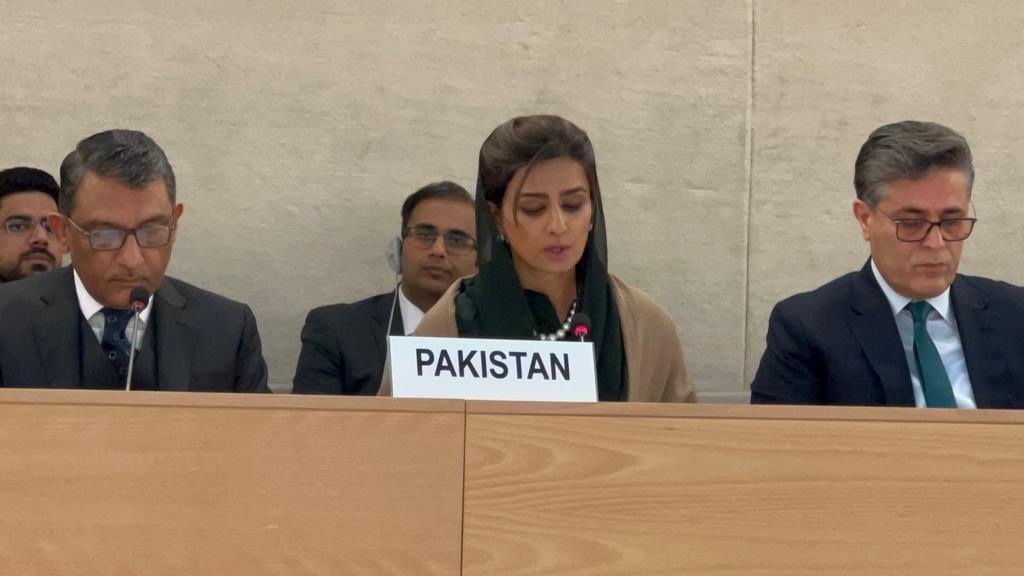Geneva, 31 January 2023 (TDI): The Minister of State for Foreign Affairs of Pakistan, Hina Rabbani Khar represented the human rights record of Pakistan to the United Nations Human Rights Council (UNHRC) during the 4th Universal Periodic Review (UPR) in Geneva.
Khar highlighted that the country’s human rights progress is on an upward trajectory & Pakistan will continue to be a leading voice of the vulnerable and the oppressed.
Notably, the Human Rights Council through the Universal Periodic Review mechanism periodically reviews the human rights record of every UN member state. The main aim of UPR is to strengthen the realization and enjoyment of human rights in a country.
This peer-review mechanism, which was established in 2007, provided a platform for dialogue and constructive engagement among states.
Remarks by Hina Rabbani Khar
The Minister of State for Foreign Affairs led the delegation from Pakistan. Khar emphasized the passing of legislation to protect the rights of women and children in Pakistan.
In this vein, she mentioned the Women’s Property Rights Act of 2020, the Zainab Alert, Response, and Recovery Act of 2020, and the Anti-Rape Act of 2021.
Khar highlighted that Pakistan has consistently advocated for dialogue, consensus, cooperation, and mutual respect to further the global human rights agenda.
Along these lines, she reiterated, “Today, I am pleased to report that my country’s human rights progress is on an upward trajectory. We will continue to strive for a progressive society that values everyone’s human rights.”
Also read: UNHRC Periodic Review 39th session: Suriname
While talking about the 4th UPR report Khar noted that it was prepared through a consultative process involving all stakeholders. It is an outcome of efforts during the last five years to implement the recommendations from the country’s 2017 UPR.
Women Empowerment
Hina Rabbani Khar said that Pakistan had taken several steps for women’s empowerment. She said, “We amended the Protection against Harassment of Women at Workplace Act 2010. The country has also expanded the definition of workplace harassment.”
“Our Parliament also enacted the Anti-Rape Act 2021 and the Enforcement of Women’s Property Rights Act 2020. This initiative was taken to build deterrence against the menace of rape and deprivation of women of their property rights.” Khar noted.
Child Protection
The Minister of State stressed that the protection of child rights has also remained high on Pakistan’s national agenda. In 2020, Pakistan legislated the Zainab Alert, Response, and Recovery Act.
“Legislation prohibiting child labor is already in force in the country. The Ministry of Overseas Pakistanis & Human Resource Development has notified a Child Labor Cell to coordinate and devise a consensus-based National Action Plan.” Khar continued.
Juvenile Justice System
Khar noticed the implementation of the Juvenile Justice System Act, of 2018 to handle juvenile cases in a human rights-responsive manner.
In this vein, she said, “This detailed legislation lays out a mechanism to verify the alleged offender’s age. It stipulates the provision of legal assistance to juveniles at State expense, and encourages social rehabilitation by establishing rehabilitation centers.”
“The country is constructing new jails in many parts of the country to reduce prison overcrowding. By encouraging alternatives to incarceration, provinces are also amending their parole laws for assessing offenders’ risks and needs.” The Minister noted.
During her concluding remarks, Khar thanked the Troika members-Argentina, The Gambia, and Nepal-for facilitating the Pakistan review.








